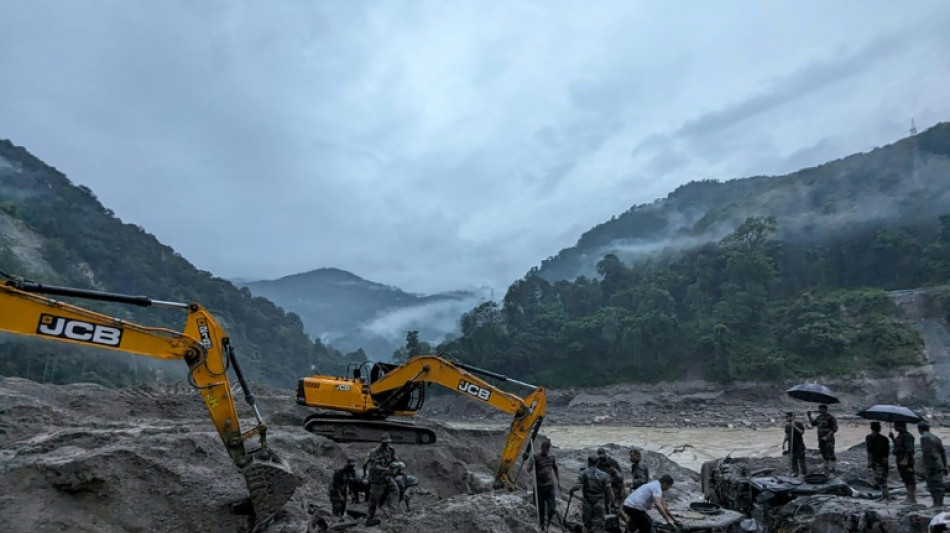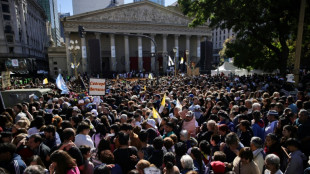
-
 'Legendary' Eubank Jr beats Benn in grudge bout
'Legendary' Eubank Jr beats Benn in grudge bout
-
Thunder sweep past Grizzlies into NBA playoffs 2nd round, Cavs on brink

-
 South Korea's Ryu and Japan's Saigo share LPGA Chevron lead
South Korea's Ryu and Japan's Saigo share LPGA Chevron lead
-
Canada leaders make closing pitches in campaign upended by Trump

-
 De Bruyne's Man City exit 'so difficult' for Guardiola
De Bruyne's Man City exit 'so difficult' for Guardiola
-
'No regrets' for Amorim over Man Utd move

-
 Lyon and Strasbourg win to close in on Europe, Montpellier relegated from Ligue 1
Lyon and Strasbourg win to close in on Europe, Montpellier relegated from Ligue 1
-
Toulouse thrash Castres as Top 14 pursuers stumble

-
 Djokovic crashes to nervous Arnaldi in Madrid opener, Swiatek advances
Djokovic crashes to nervous Arnaldi in Madrid opener, Swiatek advances
-
Olympic champs Russell, Davis-Woodhall win at Drake Relays

-
 Browns end Sanders long draft slide
Browns end Sanders long draft slide
-
Cavs crush Heat, on brink of NBA playoff sweep

-
 Fire rages after major blast at Iran port kills 8, injures hundreds
Fire rages after major blast at Iran port kills 8, injures hundreds
-
Kiwi Beamish wins Penn Relays 1,500m crown with late kick

-
 Mbappe on Real Madrid bench for Clasico Copa del Rey final
Mbappe on Real Madrid bench for Clasico Copa del Rey final
-
England survive France fightback to seal Women's 6 Nations slam

-
 Palace sweep past Villa to reach FA Cup final
Palace sweep past Villa to reach FA Cup final
-
CAF appoint Moroccan Lekjaa first vice-president

-
 Major blast at Iran port kills 5, injures hundreds
Major blast at Iran port kills 5, injures hundreds
-
Rodgers vows to stay with Celtic after fourth successive Scottish title

-
 Ipswich relegated as Newcastle, Chelsea boost top five bids
Ipswich relegated as Newcastle, Chelsea boost top five bids
-
Canada leaders make final pitches in campaign upended by Trump

-
 Mullins -- Ireland's national training treasure
Mullins -- Ireland's national training treasure
-
US, Iran say progress in 'positive' nuclear talks

-
 Mullins emulates O'Brien with second successive trainer's title
Mullins emulates O'Brien with second successive trainer's title
-
Ipswich relegated after one season in Premier League

-
 Just Stop Oil activist group holds final march
Just Stop Oil activist group holds final march
-
Djokovic crashes to nervous Arnaldi in Madrid opener

-
 Syria's Kurds demand 'democratic decentralised' Syria
Syria's Kurds demand 'democratic decentralised' Syria
-
Leverkusen win to delay Bayern and Kane's title party

-
 Buenos Aires farewells native pontiff with tears and calls to action
Buenos Aires farewells native pontiff with tears and calls to action
-
Turkey's opposition says Erdogan's canal plan behind latest arrests

-
 Maresca hails 'nasty' Chelsea as top five bid stays alive
Maresca hails 'nasty' Chelsea as top five bid stays alive
-
Trump raises Putin doubts after Zelensky talks at pope's funeral

-
 Major blast at Iran port kills 4, injures hundreds
Major blast at Iran port kills 4, injures hundreds
-
Napoleon's sword to be sold at auction in Paris

-
 Iran, US discuss nuclear deal in third round of talks
Iran, US discuss nuclear deal in third round of talks
-
Buenos Aires farewells native pontiff with call to action

-
 Warholm sets hurdles world record at Diamond League, Holloway shocked
Warholm sets hurdles world record at Diamond League, Holloway shocked
-
US students 'race' sperm in reproductive health stunt

-
 Wikileaks founder Assange joins crowds for pope funeral
Wikileaks founder Assange joins crowds for pope funeral
-
Leader Marc Marquez claims Spanish MotoGP sprint victory

-
 Celtic win fourth successive Scottish Premiership title
Celtic win fourth successive Scottish Premiership title
-
Jackson ends drought as Chelsea boost top five push

-
 Warholm sets 300m hurdles world record in Diamond League opener
Warholm sets 300m hurdles world record in Diamond League opener
-
Major blast at south Iran port kills 4, injures hundreds

-
 Russia says retook Kursk from Ukraine with North Korean help
Russia says retook Kursk from Ukraine with North Korean help
-
Francis laid to rest as 400,000 mourn pope 'with an open heart'

-
 Trump, Zelensky meet on sidelines of pope's funeral
Trump, Zelensky meet on sidelines of pope's funeral
-
'Shared loss': Filipino Catholics bid Pope Francis farewell


Glacial lake floods: a growing, unpredictable climate risk
Indian rescuers are searching for over 100 people missing in a flash flood caused by a glacial lake bursting its banks, a risk scientists warn is increasing with climate change.
AFP explains what glacial lake outburst floods are and the risks they pose, particularly in parts of Asia:
What is a glacial lake outburst flood?
A glacial lake outburst flood (GLOF) is the sudden release of water that has collected in former glacier beds.
These lakes are formed by the retreat of glaciers, a naturally occurring phenomenon that has been turbocharged by the warmer temperatures of human-caused climate change.
Glacier melt is often channelled into rivers, but ice or the build-up of debris can form what is effectively a natural dam, behind which a glacial lake builds.
If these natural dams are breached, large quantities of water can be released suddenly from the lakes, causing devastating flooding.
What causes these breaches?
The natural dams holding back glacial lakes can be breached for a variety of reasons, explained Lauren Vargo, a glacier expert and scientist at the Antarctic Research Centre in New Zealand.
Causes include "an avalanche of snow, or a landslide causing a wave in the lake, or overfilling of the lake... from rain or the glacier melting", she told AFP.
Sometimes the dam has been gradually degraded over time, or is ruptured by an event like an earthquake.
The breaches are highly unpredictable, "because they can be caused by so many different factors", she added.
What is the impact of climate change?
Climate change is driving the disappearance of glaciers, with half the Earth's 215,000 glaciers projected to melt by the end of the century, even if warming can be capped at 1.5 degrees Celsius.
The volume of glacial lakes has jumped by 50 percent in 30 years, according to a 2020 study based on satellite data.
The more and larger lakes form, the greater the risk they pose to populations downstream.
Climate change is not only driving the creation of glacial lakes, but also can produce the conditions that result in dam breaches.
"The flooding can be caused by glaciers melting or these big rainfall events, we know that's happening more because of climate change," said Vargo.
How dangerous are these floods?
The particular danger of GLOFs lies in their unpredictability.
"The probability of a lake releasing a GLOF is difficult to accurately quantify without detailed and localised studies," a study of the problem globally warned this year.
The study, published in Nature Communications, found that 15 million people live within 50 kilometres (31 miles) of a glacial lake and within one kilometre of potential flooding from a breach.
The risk was greatest in "High Mountains Asia", an area that covers parts of 12 countries, including India, Pakistan, China and Nepal.
That is partly because more people live closer to glacial lakes in the region than in other parts of the world, making warning times even shorter.
But it also reflects the vulnerability of those populations, who may be poorer and less prepared to deal with the sudden arrival of catastrophic floodwaters.
"The most dangerous basins... do not always host the most, or the largest, glacial lakes," the authors wrote.
"Rather it is the high number of people and the reduced capacity of those people to cope with disaster that plays a key role in determining overall GLOF danger."
Thousands of people, for example, have been killed by glacier lake outburst floods in High Mountains Asia but only a handful in North America's Pacific Northwest, even though that region has twice as many glacial lakes.
Experts have called for more research on the risks posed by GLOFs, particularly in the Andean region, which remains comparatively understudied, but also for better preparedness.
"But then there's the larger part of what we can do in terms of reducing emissions, to try to slow down climate change and reduce the threats of this from growing even more," Vargo said.
D.Sawyer--AMWN



